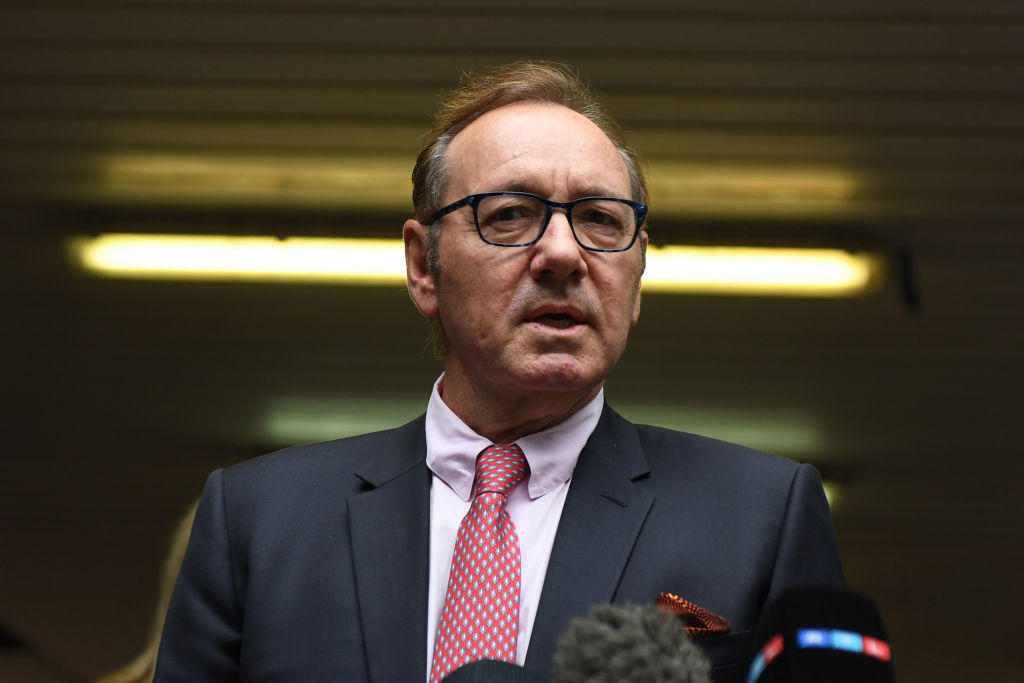This morning in a London court, a jury handed down a verdict. The actor Kevin Spacey stood accused of nine counts of sexual assault, which had sparked up in the aftermath of #MeToo; six years later, the jury acquitted him of all of them. Though he had remained stoic during the trial, he cried as the final “not guilty” was read aloud. The two-time Oscar winner, star of House of Cards and American Beauty, former artistic director of the famous Old Vic theater and reluctantly outed gay man was free. He turned sixty-four years old today.
To some, this is a massive miscarriage of justice. Kat Tenbarge of NBC — often quick to outrage— tweeted that, given the male-majority jury, this was “a reminder of how men treat other men, too, when they make sexual assault allegations.” The complaints against Spacey had emerged at the height of the #MeToo movement, with Harvey Weinstein’s heinous crimes finally coming to light, and Star Trek actor Anthony Rapp said he felt compelled to come forward about Spacey, and did so to BuzzFeed.
Few questioned Rapp’s story much. After all, everyone hates Hollywood, and knows it is home to some disgusting, abusive perverts; one had already been revealed in Weinstein — and they were going to find more. More stories about Spacey would follow.
Spacey’s awkward, even slightly creepy romantic manner was not news to those who worked with him in the London theater scene, or on Hollywood movie sets, but the sentiment was that these advances were awkward, and a bit pathetic, but not assault. Sometimes they just seemed funny, as awkward sexual approaches often are. Joe Rogan demonstrated this best some years ago, when the texts of one of Spacey’s “victims” came out, which revealed a very different side to the story.
But this was 2017. Trump was president, #MeToo was on fire and the world was angry, so Spacey was fired from House of Cards, cut out of Ridley Scott’s All The Money in the World and kicked from Hollywood. He would make it all the worse with his infamous apology tweet.
In the first paragraph, he noted that he did not remember the evening with Rapp — extreme inebriation will do that — but that, “if I did behave then as he describes,” then Rapp was owed an apology for that “deeply inappropriate drunken behavior.” In the second paragraph, he came out as a “gay man” and that he wanted to now live “honestly and openly and that starts with examining my own behavior.”
For those who assumed his guilt, this was the ultimate insult. He appeared to be admitting to being a pedophilic sexual predator, but then was blaming it on being gay!
But re-reading it today, the truth in Spacey’s poorly timed, terribly considered apology is clear. This was a famous gay man, who had lived and struggled in the celluloid closet and acted in awkward ways often because of it. He was finally trying to be free of it — to live as himself — and hopefully have a simpler romantic life moving forward.
The “closet” sounds so polite, so benign; and today, it is. To “come out” is a party; a reveal simply that you aren’t quite who others thought you were, usually accompanied by lots of rainbow graphics and “YASSSS” comments. The rainbow-positivity-cladding of everything today is a bit wearisome; but the greatest developments of the modern gay rights movement has not been the legal protections it has afforded families — however wonderful that is — but lessening the pressure to stay in a lie.
Coming of age in a less tolerant era, gay men of Spacey’s generation had to hide who they were, and find love in secret. They couldn’t invite their crushes to the prom, and have first dates at bowling alleys, and have heartbreak to talk about with their friends. It’s no wonder some of them became men who didn’t know how to flirt properly.
After today’s verdict, there is no evidence that Spacey is the predator many made him out to be. When Spacey was forced to come out, he didn’t have to live a lie anymore. Hopefully, with this court decision, he can start living in that freedom.

























